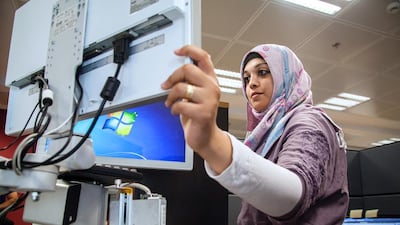Ameen Abu Leil, a resident of Nazareth Illit, studied at the Technion technology institute in Haifa and noticed no difference in the treatment of Arabs and their Jewish counterparts as high-tech trainees.
But as soon as he graduated, he says the segregation between the two groups in Israel was obvious.
“I sent CVs out in 2001 and I travelled in my car going from company to company looking for a job – some companies kicked me out – some were nice to me and said they would come back to me, but I got zero interviews,” he says.
Mr Abu Leil’s father studied computer science and warned him against studying the subject, saying he would end up teaching instead.
Each year 400 Arabs graduate with high-tech related degrees, but 44 per cent end up working as teachers, according to government job seeker statistics.
“My parents didn’t talk to me for two weeks when I told them I was going to study it,” says Mr Abu Leil.
“The most disappointing thing about not getting a job was, for the first time in my life, my dad was right; this upset me more than the fact that I hadn’t found a job.”
However, Mr Abu Leil later joined Galil in 2008, a software company based in Nazareth that supports up to 15 Israeli research and development (R&D) companies. Mr Abu Leil is in charge of customer projects.
The company employs mainly Arab high-tech engineers.
Another Galil employee, Yousef Karkaby, 34, says he had to go to more extreme measures to secure a job as an Arab high-tech professional in Israel. He wanted to work in Tel Aviv after finishing a traineeship in northern Israel.
“I was frustrated so I decided to do something that I didn’t like doing – I lied – I changed my residence to Haifa city, which is a mixed city and I also removed the fact that I could speak Arabic.
“I sent my CV out again to the same companies and within three weeks – after interviews and everything – I had three contracts to chose from – the phone didn’t stop ringing,” he says.
In 2008 there were 350 Arab engineers in the whole of Israel working in the high-tech industry. Today of the 100,000 software developers in Israel 2,000 are Arabs. In Nazareth there are 600 Arab software developers when there had been only 40 in 2008, according to figures from Tsofen, a non-profit organisation whose mission is to promote the integration of Israel’s Arab citizens into the high-tech industry.
“It’s still a small number but to us it’s a huge number and it’s the beginning of a high-tech community here,” says Smadar Nehab, a co-founder of Tsofen, which helped to set up Galil.
“I believe this place [Israel] has to fairly hold the two people. Arabs and Jews are completely separated in Israel – there is a huge chasm. The only place they meet is in universities, and they still don’t interact much and after they finish they go into separate workplaces,” adds Ms Nehab.
“Most of the Arab population is in the north and there are no workplaces in the north. Relocating to Tel Aviv is not possible for Arabs because of the separation.”
Ms Nehab, a Jewish software engineer who graduated from the Weizmann Institute in Israel in the 1980s and led several successful start-ups in California, partnered with the Arab-Israeli economist Sami Saadi to create Tsofen.
It has received US$1 million in funding from the US Agency for International Development to pursue its goal of integration of Arab professionals into the sector.
“Instead of bring Arab engineers to the high-tech industry we wanted to bring high-tech into Arab communities,” says Ms Nehab.
This was a major draw for Arab women who were unable to travel to work far from their homes and communities.
Now 30 per cent of the high-tech workforce in Nazareth are women – the same proportion as in Israel.
Imad Younis runs the cutting edge medical device company Alpha and Omega, which operates from the Nazareth Industrial Park and predominantly employs Arabs.
Mr Younis points to a device that is being produced, which is connected to the human brain and records the neural signals being recorded from the brain on a screen.
“Most of our customers are in the US, Europe and Asia – 95 per cent of the devices are exported out of Israel,” he says.
business@thenational.ae
Follow The National's Business section on Twitter

